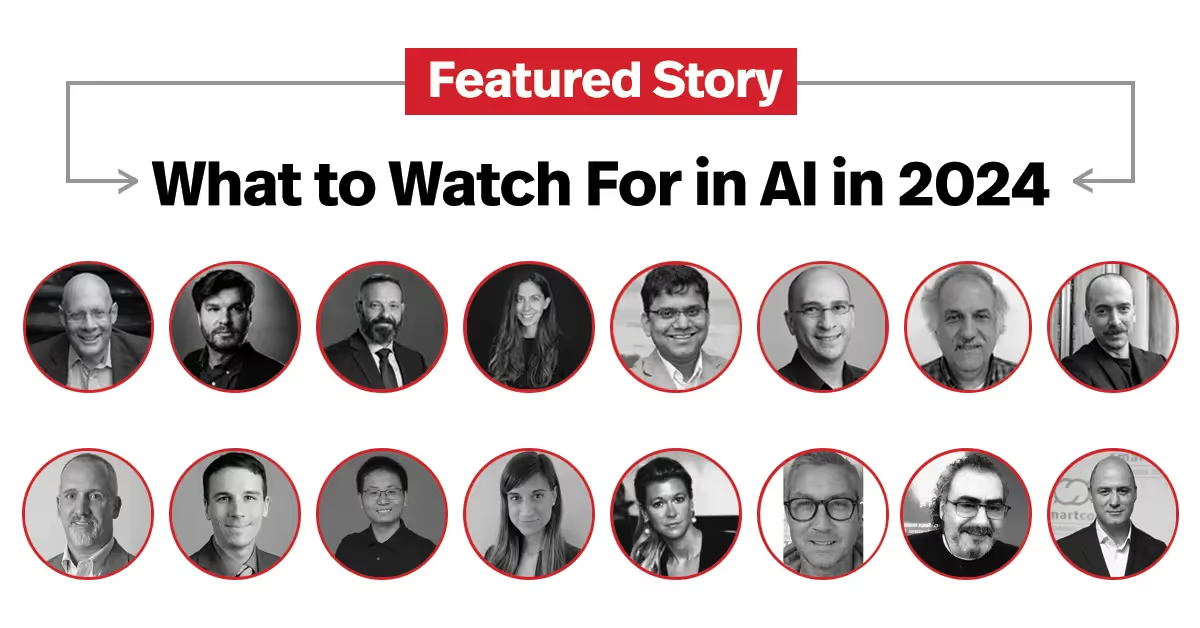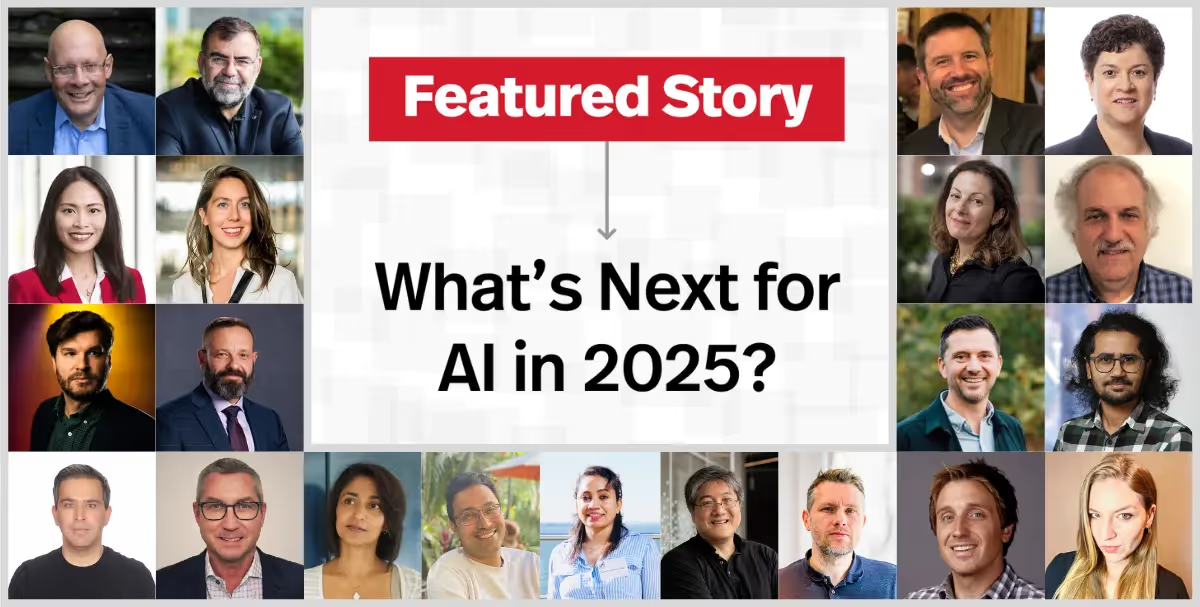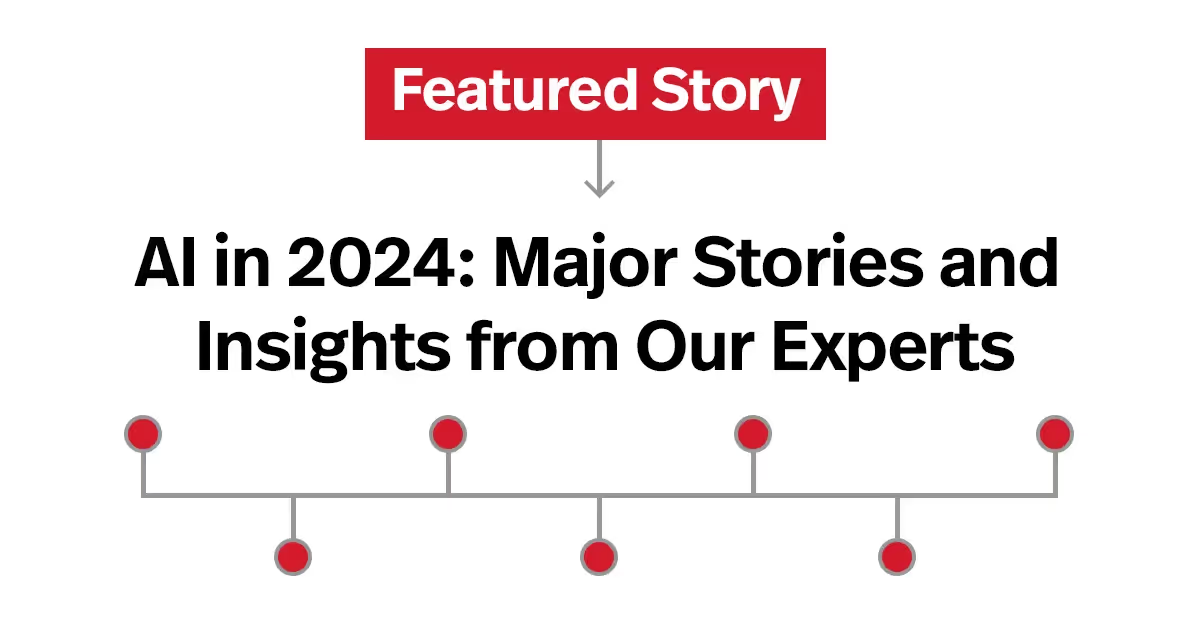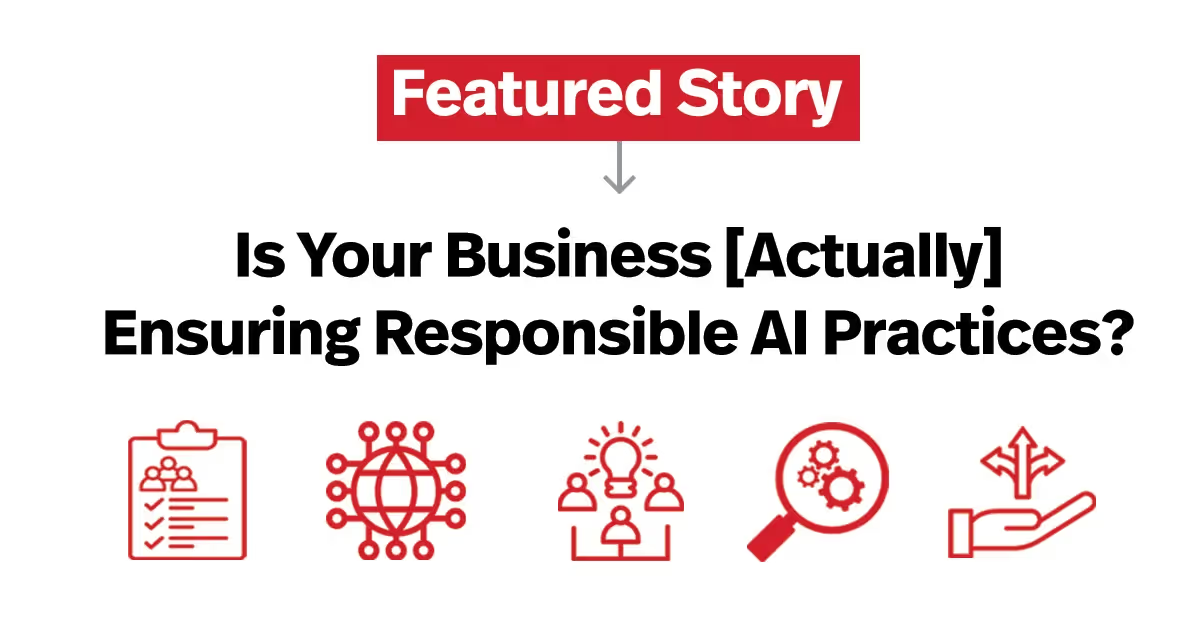What to Watch For in AI in 2024

In the first full year of generative AI, we saw an explosion of hype and a number of tantalizing use cases. Looking forward, the AI industry is showing no signs of slowing down in 2024, with some experts predicting huge leaps in AI’s capabilities and others expecting more modest gains as companies get better at harnessing AI’s strengths.

"If they haven’t already, businesses will start taking the risks of AI more seriously. I am more convinced than ever that proper and responsible use of AI tools can bring real business value. While the growth of generative AI will be a focus in 2024, the dramatic increase in the use of Predictive AI and Classical AI methods will grow even faster. Finally, I think 2024 will see many organizations realize the importance of capturing granular, detailed data and making sure it is annotated, labeled, and in context."
- Usama Fayyad, Executive Director at the Institute for Experiential AI

"In the next few years, AI curriculum will be an essential component of many clinical education programs. AI will also be used to save costs, reduce errors, and reduce stress for health care workers while creating more informed and proactive consumers."
- Gene Tunik, Director of AI + Health at the Institute for Experiential AI

"We will read about the impact of AI throughout the pharmaceutical lifecycle, including various stages of R&D, clinical trial design, regulatory approval, and the identification of novel combination therapies. AI partnerships and investments will be announced by large pharmaceutical companies, venture capital firms, government agencies, and private investors. Hopefully, we will also receive substantive guidance from regulatory authorities on the use of AI in the pharmaceutical industry."
- Sam Scarpino, Director of AI + Life Sciences at the Institute for Experiential AI

"Will companies pay more attention and allocate more resources for AI ethics and Responsible AI or will they wait for scandals? As many companies laid off or disbanded their internal AI ethics teams, will they restructure them, work with outside interdependent organizations, or simply disregard AI ethics?"
- Cansu Canca, Director of Responsible AI Practice at the Institute for Experiential AI

"AI will be used with our existing knowledge of physics and processes to help us get better at anticipating and preparing for the disasters of the future.”
- Auroop Ganguly, Director of AI for Climate & Sustainability (AI4CaS) at the Institute for Experiential AI

"We’ll gain a more granular understanding of ChatGPT’s impact. A lot of people are claiming ChatGPT boosts productivity, but we recently found it brings significant declines in the quality of user-submitted reviews on the internet, at least for most people. ChatGPT’s impact on many other kinds of content is not yet fully understood, and these questions have important implications for companies in every industry."
- Yakov Bart, Faculty Leadership Committee Member at the Institute for Experiential AI

"The big new thing will be the move of Large Language Models (LLMs) to phones. It is becoming just feasible to move some smaller LLMs to larger phones. This may cause phones to become larger (in terms of memory, and maybe power), but that might take more than a year. Additionally, I am even more worried about malware like Pegasus. There need to be much larger penalties in the court of public opinion for trafficking in misinformation, and zero tolerance for malware like Pegasus. I don't see that happening. There will be a little regulation, but it will be more annoying than productive. I don't think it is focused on serious threats like Pegasus.
- Kenneth Church, Senior Principal Research Scientist at the Institute for Experiential AI

"Although AI ethics initially became famous for product/platform-specific bias audits, lone whistleblowers, and short-lived committees, leading organizations now realize the need for more systematic approaches. Deploying AI and, likewise, Responsible AI, demand a strategy that spans teams and verticals, with new expertise, creative design workflows, and compliance with emerging regulations."
- Matthew Sample, AI Ethicist, Responsible AI Practice at the Institute for Experiential AI

"AI is already impacting the fields of computer architecture and high-performance computing. I predict we will continue to see new models come out that will motivate new classes of accelerators and new algorithms for optimizing the performance of these models.”
- David Kaeli, Faculty Leadership Committee Member at the Institute for Experiential AI

"I am concerned that as AI becomes its own profession, the core work will become separated from the disciplines in which it is being applied. To what extent should we teach AI fundamentals to civil engineers, for instance, if all the AI algorithms are going to be developed by AI professionals without an engineering background?"
- Michael Kane, Assistant Professor of Civil and Environmental Engineering at Northeastern University

"Overall, AI will create many new opportunities for the materials science and additive manufacturing communities. There will be more efficient language models for text mining and new models for materials development. There will be more automatic tools developed to replace tedious and repetitive tasks for materials design and collection of engineering data. And explainable AI techniques will become more widely accepted and used in the materials science community."
- Cheng Zeng, Postdoctoral Research Fellow at The Roux Institute

"We will keep seeing more use cases of AI in health and education. The debate on the needed regulations and policies for AI deployment will continue. I think it is important to regulate the deployment of AI to ensure that it enhances human capabilities rather than replacing them. The goal of AI should be to add value to human work, enabling people to work more comfortably and yield higher-quality outcomes. Active involvement of AI researchers in anticipating the consequences of AI deployment is important and necessary."
- Agata Lapedriza, Principal Research Scientist at the Institute for Experiential AI

"I'm concerned about inequity continuing and becoming more drastic, which could lead to even more social turmoil, misinformation and mis(under) education of those who don't have access to resources, learnings, etc. Organizations as a whole need to shift their cultures and become more agile, leaders accustomed to planning need to learn how to calculate the unpredictable and rapid progression and advancements through AI that are impacting the workforce. But 2024 will also bring exciting times, with the need to support people, workplaces and societies through ambiguity, uncertainty and change, something the human brain is naturally wired to do well. I also see increasing challenges and opportunities in our multi-generational workforce, those who are more set in their ways vis-à-vis a progressive, young workforce more open and accustomed to change brought by technology. Overall, we humans will be trying to catch up to the exponential evolution of technology for some time to come.
- Sabrina Sidl, Director of Strategy and Partnerships at the Institute for Experiential AI

"AI will create incredible time savings for many knowledge worker tasks, and we’ll see AI applied throughout the business tech stack. Generative AI advances will also impact other kinds of content, including images, music, code, and text."
- Tim Weidinger, Director of Business Development at the Institute for Experiential AI

"Explainability of the black boxes that dominate current AI will remain to be a major concern. Generative AI will face a major challenge related to copyright issues and that will hinder progress in tools like ChatGPT and other LLMs. Also, deep learning as the only approach to AI will start to be questioned. I believe knowledge graphs and ontologies will become a focus of many AI research."
- Walid Saba, Senior Research Scientist at the Institute for Experiential AI

"Skills gap for roles such as data scientist and data engineer have been a significant barrier for a while and I expect this to get even deeper in 2024 with the huge spike in interest in AI initiatives across the industry. One particular role that will be more critical within this context will be AI Product Managers, who will play an important role in developing effective and responsible AI solutions. I also expect data and AI literacy to be a big area of focus as more and more people will be interacting with AI systems and have access to data and insights to make decisions."
- Hamit Hamutcu, Senior Advisor at the Institute for Experiential AI




